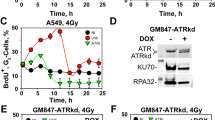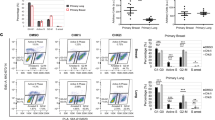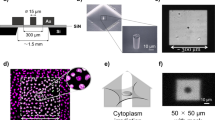Abstract
Whether Chk2 contributes to DNA damage-induced arrest in G2 has been controversial. To investigate this issue further, we generated Chk2-deficient DT40 B-lymphoma cells by gene targeting and compared their cell cycle response to ionizing radiation (IR) with wild-type (WT) and isogenic Chk1-deficient counterparts. After moderate doses of IR (4 Gy), we find that Chk2−/− cells which are in G1 or S phase at the time of irradiation arrest efficiently in G2. In contrast, Chk2−/− cells which are in G2 when DNA damage is incurred exhibit an impaired mitotic delay compared to WT, with the result that cells enter mitosis with damaged DNA as judged by the presence of numerous γ-H2AX foci on condensed chromosomes. Impaired G2 delay as the result of Chk2 deficiency can be detected at very low doses of radiation (0.1 Gy), and may allow division with spontaneous DNA damage, since a higher proportion of mitotic Chk2−/− cells bear spontaneous γ-H2AX foci and damaged chromosomes during unperturbed growth compared to WT. The contribution of Chk2 to G2/M delay is epistatic to that of Chk1, since Chk1−/− cells exhibit no measurable mitotic delay at any radiation dose tested. We suggest that this function of Chk2 could contribute to tumour suppression, since cell division with low levels of spontaneous damage is likely to promote genetic instability and thus carcinogenesis.
This is a preview of subscription content, access via your institution
Access options
Subscribe to this journal
Receive 50 print issues and online access
$259.00 per year
only $5.18 per issue
Buy this article
- Purchase on Springer Link
- Instant access to full article PDF
Prices may be subject to local taxes which are calculated during checkout








Similar content being viewed by others
References
Ahn JY, Schwarz JK, Piwnica-Worms H, Canman CE . (2000). Threonine 68 phosphorylation by ataxia telangiectasia mutated is required for efficient activation of Chk2 in response to ionizing radiation. Cancer Res 60: 5934–5936.
Bartek J, Lukas J . (2003). Chk1 and Chk2 kinases in checkpoint control and cancer. Cancer Cell 3: 421–429.
Bartkova J, Horejsi Z, Koed K, Kramer A, Tort F, Zieger K et al. (2005). DNA damage response as a candidate anti-cancer barrier in early human tumorigenesis. Nature 434: 864–870.
Bell DW, Varley JM, Szydlo TE, Kang DH, Wahrer DC, Shannon KE et al. (1999). Heterozygous germ line hCHK2 mutations in Li–Fraumeni syndrome. Science 286: 2528–2531.
Cao L, Kim S, Xiao C, Wang RH, Coumoul X, Wang X et al. (2006). ATM-Chk2-p53 activation prevents tumorigenesis at an expense of organ homeostasis upon Brca1 deficiency. EMBO J 25: 2167–2177.
Chen Y, Sanchez Y . (2004). Chk1 in the DNA damage response: conserved roles from yeasts to mammals. DNA Repair (Amst) 3: 1025–1032.
Hirao A, Cheung A, Duncan G, Girard PM, Elia AJ, Wakeham A et al. (2002). Chk2 is a tumor suppressor that regulates apoptosis in both an ataxia telangiectasia mutated (ATM)-dependent and an ATM-independent manner. Mol Cell Biol 22: 6521–6532.
Hirao A, Kong YY, Matsuoka S, Wakeham A, Ruland J, Yoshida H et al. (2000). DNA damage-induced activation of p53 by the checkpoint kinase Chk2. Science 287: 1824–1827.
Jallepalli PV, Lengauer C, Vogelstein B, Bunz F . (2003). The Chk2 tumor suppressor is not required for p53 responses in human cancer cells. J Biol Chem 278: 20475–20479.
Jazayeri A, Falck J, Lukas C, Bartek J, Smith GC, Lukas J et al. (2006). ATM- and cell cycle-dependent regulation of ATR in response to DNA double-strand breaks. Nat Cell Biol 8: 37–45.
Lukas C, Bartkova J, Latella L, Falck J, Mailand N, Schroeder T et al. (2001). DNA damage-activated kinase Chk2 is independent of proliferation or differentiation yet correlates with tissue biology. Cancer Res 61: 4990–4993.
Mailand N, Bekker-Jensen S, Bartek J, Lukas J . (2006). Destruction of Claspin by SCFbetaTrCP restrains Chk1 activation and facilitates recovery from genotoxic stress. Mol Cell 23: 307–318.
Matsuoka S, Huang M, Elledge SJ . (1998). Linkage of ATM to cell cycle regulation by the Chk2 protein kinase. Science 282: 1893–1897.
McGowan CH . (2002). Checking in on Cds1 (Chk2): a checkpoint kinase and tumor suppressor. Bioessays 24: 502–511.
Miller CW, Ikezoe T, Krug U, Hofmann WK, Tavor S, Vegesna V et al. (2002). Mutations of the CHK2 gene are found in some osteosarcomas, but are rare in breast, lung, and ovarian tumors. Genes Chromosomes Cancer 33: 17–21.
Nevanlinna H, Bartek J . (2006). The CHEK2 gene and inherited breast cancer susceptibility. Oncogene 25: 5912–5919.
O'Connell MJ, Walworth NC, Carr AM . (2000). The G2-phase DNA-damage checkpoint. Trends Cell Biol 10: 296–303.
Peschiaroli A, Dorrello NV, Guardavaccaro D, Venere M, Halazonetis T, Sherman NE et al. (2006). SCFbetaTrCP-mediated degradation of Claspin regulates recovery from the DNA replication checkpoint response. Mol Cell 23: 319–329.
Sancar A, Lindsey-Boltz LA, Unsal-Kacmaz K, Linn S . (2004). Molecular mechanisms of mammalian DNA repair and the DNA damage checkpoints. Annu Rev Biochem 73: 39–85.
Shiromizu T, Goto H, Tomono Y, Bartek J, Totsukawa G, Inoko A et al. (2006). Regulation of mitotic function of Chk1 through phosphorylation at novel sites by cyclin-dependent kinase 1 (Cdk1). Genes Cells 11: 477–485.
Skoufias DA, Lacroix FB, Andreassen PR, Wilson L, Margolis RL . (2004). Inhibition of DNA decatenation, but not DNA damage, arrests cells at metaphase. Mol Cell 15: 977–990.
Sonoda E, Sasaki MS, Buerstedde JM, Bezzubova O, Shinohara A, Ogawa H et al. (1998). Rad51-deficient vertebrate cells accumulate chromosomal breaks prior to cell death. EMBO J 17: 598–608.
Sorensen CS, Syljuasen RG, Falck J, Schroeder T, Ronnstrand L, Khanna KK et al. (2003). Chk1 regulates the S phase checkpoint by coupling the physiological turnover and ionizing radiation-induced accelerated proteolysis of Cdc25A. Cancer Cell 3: 247–258.
Takai H, Naka K, Okada Y, Watanabe M, Harada N, Saito S et al. (2002). Chk2-deficient mice exhibit radioresistance and defective p53-mediated transcription. EMBO J 21: 5195–5205.
Takao N, Kato H, Mori R, Morrison C, Sonada E, Sun X et al. (1999). Disruption of ATM in p53-null cells causes multiple functional abnormalities in cellular response to ionizing radiation. Oncogene 18: 7002–7009.
Xu B, Kim ST, Lim DS, Kastan MB . (2002). Two molecularly distinct G(2)/M checkpoints are induced by ionizing irradiation. Mol Cell Biol 22: 1049–1059.
Yu Q, Rose JH, Zhang H, Pommier Y . (2001). Antisense inhibition of Chk2/hCds1 expression attenuates DNA damage-induced S and G2 checkpoints and enhances apoptotic activity in HEK-293 cells. FEBS Lett 505: 7–12.
Zachos G, Rainey MD, Gillespie DA . (2003). Chk1-deficient tumour cells are viable but exhibit multiple checkpoint and survival defects. EMBO J 22: 713–723.
Acknowledgements
We thank Dr Gareth Inman for insightful comments on the manuscript. This work was supported by Cancer Research UK (CR-UK) and the Association for International Cancer Research (AICR).
Author information
Authors and Affiliations
Corresponding author
Rights and permissions
About this article
Cite this article
Rainey, M., Black, E., Zachos, G. et al. Chk2 is required for optimal mitotic delay in response to irradiation-induced DNA damage incurred in G2 phase. Oncogene 27, 896–906 (2008). https://doi.org/10.1038/sj.onc.1210702
Received:
Revised:
Accepted:
Published:
Issue Date:
DOI: https://doi.org/10.1038/sj.onc.1210702
Keywords
This article is cited by
-
Variation in pentose phosphate pathway-associated metabolism dictates cytotoxicity outcomes determined by tetrazolium reduction assays
Scientific Reports (2023)
-
Correlation of homologous recombination deficiency induced mutational signatures with sensitivity to PARP inhibitors and cytotoxic agents
Genome Biology (2019)
-
DNA-PKcs and ATM epistatically suppress DNA end resection and hyperactivation of ATR-dependent G2-checkpoint in S-phase irradiated cells
Scientific Reports (2019)
-
Radiation-dose-dependent functional synergisms between ATM, ATR and DNA-PKcs in checkpoint control and resection in G2-phase
Scientific Reports (2019)
-
Indicators of replicative damage in equine tendon fibroblast monolayers
BMC Veterinary Research (2013)



